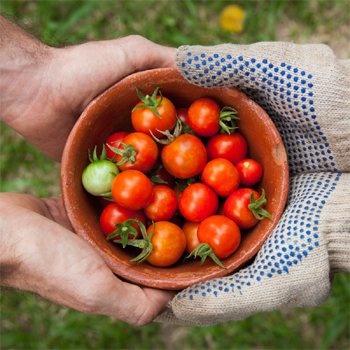Health benefits of gardening

Gardening can build community and connect people to each other.
By Kerry Mello, Workplace Mindfulness Project Manager
Gardening – tending flowers, fruits, vegetables and even weeds, has lasting benefits for our bodies, minds and souls. In fact, your mother's advice not to play in the dirt wasn’t such good wisdom after all.
Gardening benefits all ages and you don't need to cultivate acres to reap rewards. Even tiny gardens in patio pots can have positive, lasting effects. Research is underway to see how and why gardening is good for us.
One surprising finding is that dirt is medicine. Scientists have discovered a microscopic bug, or microbe, in dirt that has similar benefits as common drugs that treat depression. Tests showed this microbe increases the level of our happy hormone (serotonin) in the brain.
Humans have a special connection with nature and studies show the natural world has a calming effect on our minds and bodies. Spending time in nature can reduce the level of a stress chemical that impacts mood, memory and our body’s ability to fight germs.
Gardening also helps people worry less about everyday stress and focus more on the world around them. Gardening literally “grounds” us. The tasks of digging, planting and nurturing plants help individuals reconnect with their world and forget emotional pain. Joining a community garden, or tending a garden with others has social benefits and gives people a sense of teamwork and pride.
Growing and eating fresh fruits and vegetables also has many benefits for our diet and physical health. The intense activity of pulling up weeds or hacking off branches is great exercise and can help people vent frustrations in a positive way.
A less tangible, but very important benefit of gardening is that it gives people hope. The very act of planting and nurturing a seed and watching it grow is both satisfying and wondrous.
Disclaimer
This articles provide general information for educational purposes only. The information provided in this article, or through linkages to other sites, is not a substitute for medical or professional care, and you should not use the information in place of a visit, call consultation or the advice of your physician or other healthcare provider.